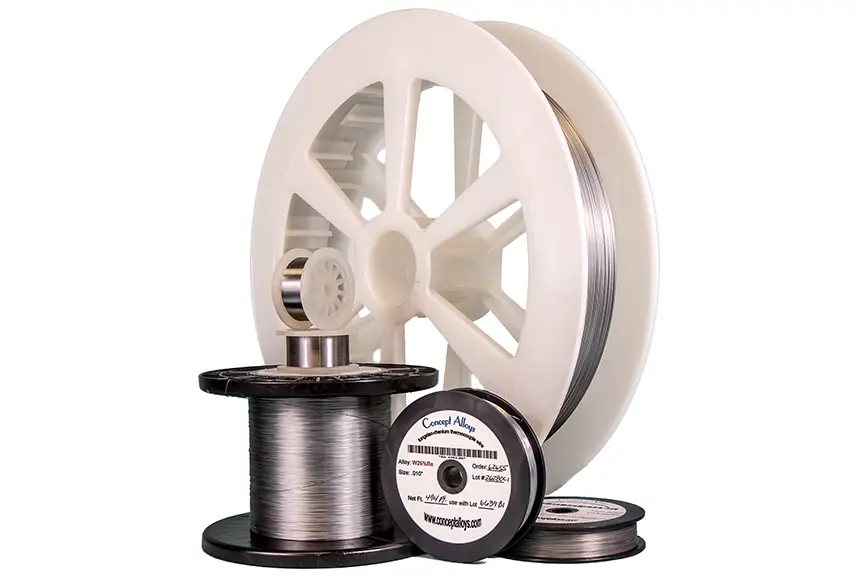Our partner for Tungsten Rhenium thermocouple wire
Concept Alloys
Tungsten Rhenium Type C and D thermocouple wire is used to make the highest temperature thermocouples that exist, reaching up to 2320 °C. We are proud to partner with Concept Alloys from the USA in supplying our European and international clients with these unique wires of outstanding quality.
Concept Alloys, based in Michigan, was founded in 2002 and is widely known for its proprietary testing and calibration methodologies. Concept Alloys measures each end of every coil produced by calibration in-house, on-site. Due to their calibration expertise the company is capable of supplying special EMF tolerances for the most critical applications.
Their extensive experience in Tungsten Rhenium alloys means they have developed unparalleled knowledge which they transfer into product development and excellent technical support.
Our products from Concept Alloys and their uses
Type C wires have a composition of Tungsten 5% Rhenium versus Tungsten 26% Rhenium. Type D wires are Tungsten 5% Rhenium versus Tungsten 25% Rhenium. Type D thermocouple wire is actually an unofficial industry term.
An exceptional attribute of Concept Alloys is that via special order they can deliver Type C and Type D bare wires with an extremely small diameter, as little as 0.0127 mm. To do this they have developed an in-house technique of drawing, cleaning and annealing a wire with a larger diameter.
Tungsten Rhenium thermocouple wires are designed with the goal of accurately transmitting temperature readings in ultra high heat situations from the probe to the measurement instrumentation. They are specifically selected for temperatures and conditions beyond the capabilities of platinum thermocouples. The tungsten rhenium alloy is very stable at high temperature and functions excellently in vacuums and inert atmospheres. However, they cannot be used in oxidizing environments. These ultra high temperature wires are useful for a wide range of industries such as aerospace, power generation and semiconductor. They are particularly well-suited for vacuum furnaces at extremely high temperatures.

Quality control
Tungsten Rhenium wires are used in extreme conditions where reliability is key. Concept Alloys has stringent quality controls and proprietary processes to ensure accuracy and uniformity:
- EMF properties test are done of each coil individually, not in batches.
- EMF is tested at finished wire size and tested up to +2300°C (4200 F)
- Every finished coil meets end-to-end uniformity tolerance for every 100°C, from +100°C to +2300°C.
- Instead of relying on extrapolation, all tests are in fact performed over the entire temperature range for the specific wire size.
- Using laser micrometer technology, the diameter and roundness of all wire is carefully monitored. Dimensional uniformity is thus ensured.
Valued partnership
The team at Concept Alloys has accumulated years of experience in producing and working with tungsten rhenium wires. This specialist knowledge is reflected in the exceptional standard of their products as well as in their willingness to offer advice and support with trouble-shooting when needed. This dedicated customer service also includes full traceability of products and quick delivery times.
The company works with specially designed New Product Development (NPD) teams in order to continue research into temperature measurement, oxidation resistance and corrosion resistance for Tungsten Rhenium alloys. This approach ensures that Concept Alloys remains innovative and up to date with the latest developments.
Reach out to us
All in all, Concept Alloys is a valued partner to Kamet. To find out more about them you can visit their website.
If you have specific questions about your own thermal challenges or temperature monitoring needs, then please contact us for more information and advice.
